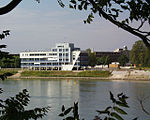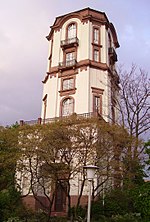Konrad Adenauer Bridge
Bridges in Baden-WürttembergBridges in Rhineland-PalatinateBridges over the RhineBuildings and structures in LudwigshafenBuildings and structures in Mannheim ... and 2 more
Konrad AdenauerRailway bridges in Germany

The Konrad Adenauer Bridge (in German: Konrad-Adenauer-Brücke) is one of two road bridges crossing the Rhine between the German cities of Mannheim and Ludwigshafen am Rhein. The other bridge is the Kurt Schumacher Bridge. The road bridge connects a network of roads from behind Mannheim Palace across the Rhine to Ludwigshafen. It carries Federal Highway 37 and a tram track. Two rail bridges are adjacent to the road bridge, carrying the Palatine Ludwig Railway and the Rhine-Neckar S-Bahn line.
Excerpt from the Wikipedia article Konrad Adenauer Bridge (License: CC BY-SA 3.0, Authors, Images).Konrad Adenauer Bridge
Konrad-Adenauer-Brücke, Mannheim Mitte (Innenstadt/Jungbusch)
Geographical coordinates (GPS) Address External links Nearby Places Show on map
Geographical coordinates (GPS)
| Latitude | Longitude |
|---|---|
| N 49.481111111111 ° | E 8.4563888888889 ° |
Address
Konrad-Adenauer-Brücke
Konrad-Adenauer-Brücke
68159 Mannheim, Mitte (Innenstadt/Jungbusch)
Baden-Württemberg, Germany
Open on Google Maps










